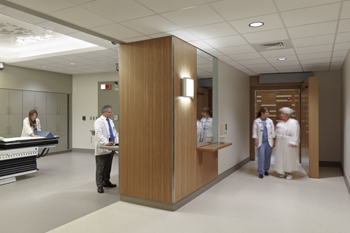What to Expect from Radiation Oncology Treatment
Contact the Department of Radiation Oncology
Contact us to make an appointment or to learn more about our programs.
The radiation treatment process includes a consultation visit, simulation session, and radiation treatment visits. This page lets you know what you can expect during each of these visits.
Your Radiation Consultation Visit
Your first visit with the radiation oncologist is called your consultation visit. The radiation oncologist will review all your records and pathology reports and give you a physical exam. During this first visit, your doctor and nurse will go over information about your type of cancer, the radiation treatment choices, any possible side effects, and treatment consent.
Planning Your Treatment - Simulation
 Your radiation treatment team will set up and plan your radiation therapy in a process called simulation. The simulation consists of a CT scan or x-rays of the specific area where the tumor is located. Some scans require the use of a contrast material such as barium or dye or metal markers in or near the area to be treated, which makes certain organs visible on the x-ray. With the help of these x-rays and scans, your radiation oncologist will map out the exact location of your tumor and the area to be treated.
Your radiation treatment team will set up and plan your radiation therapy in a process called simulation. The simulation consists of a CT scan or x-rays of the specific area where the tumor is located. Some scans require the use of a contrast material such as barium or dye or metal markers in or near the area to be treated, which makes certain organs visible on the x-ray. With the help of these x-rays and scans, your radiation oncologist will map out the exact location of your tumor and the area to be treated.
After the simulation process, your radiation therapist may mark or tattoo your skin. A tattoo is a tiny ink dot marker injected under the skin that helps line up the treatment area. These marks or tattoos are very important because they allow the radiation therapist to position you the same way for each treatment.
Part of the simulation session is finding and recording the best body positioning for you during your treatment. Special devices, such as molds and masks, can help to keep your body in the correct position. The molds and masks are made to fit your body at the time of the simulation.
After your simulation, our radiation physicists develop a treatment plan based on your radiation oncologist's design. Once a plan has been made, your treatment can begin.
The Treatment Process
 When you come for your first radiation treatment, the daily check-in process will be explained. There are changing rooms where you can put your personal belongings. Depending on the area of your body being treated, you may be asked to change into a hospital gown.
When you come for your first radiation treatment, the daily check-in process will be explained. There are changing rooms where you can put your personal belongings. Depending on the area of your body being treated, you may be asked to change into a hospital gown.
Family or friends may come with you to your treatment session. They can sit in the waiting area while you are having treatment. There is also a special waiting area with books and videos for young children.
In the treatment room, your radiation therapist will check and recheck all of the equipment settings to make sure your treatment plan is followed exactly. Using the ink marks or tattoos on your skin, the radiation therapist locates your treatment area and places you in the correct position. If a mold or mask has been custom-made to help with positioning, your radiation therapist will place that on or around you.
The radiation therapist will leave the room before radiation begins. They will watch you constantly on a television monitor. Using an intercom, the therapist can hear you and talk with you throughout your radiation treatment. As soon as your treatment session is over, you may leave and go back to your normal activities.
Side Effects
The goal of radiation therapy is to destroy cancer cells, but radiation therapy can also injure or destroy normal cells. This can cause some side effects. Early or acute side effects from radiation therapy can be treated and usually go away a few weeks after your treatment ends. Fatigue, loss of appetite and skin irritation are examples of acute side effects.
Late or long-term side effects may take months or years to develop and can be permanent. Your radiation oncologist will explain in detail any possible side effects before your treatment begins.
You should always tell your treatment team about any symptoms or side effects you have. Your radiation nurse will give you specific information on how to manage side effects.
Leaders in Proton Therapy
Mass General has the only proton therapy site in all of New England, with two proton therapy centers.
Supportive Care Services
Our support programs can help patients and their families cope with the challenges of a cancer diagnosis.
